Listed local agri-business firm Kakuzi Plc has announced a marginal drop in its half-year pretax profit attributed to slower market growth and price volatility in its key export markets due to the Covid 19 pandemic.
In its half-year trading disclosures released by Chairman Nicholas Ng’ang’a, Kakuzi Plc confirmed a 3% drop in its profit before tax after posting KSh 276.7 million earnings down from KSh 285.9 million posted within the same period last year.
To sustain trading growth and mitigate market risks, the firm, he said, has swiftly moved to enhance its operating efficiencies. Further attention, he said, has also been applied to a diversification and value addition strategy for opportunities in the local market.
The leading international markets for Kakuzi products, though negatively impacted by the COVID pandemic, have begun to show positive recovery signs with growing demand in the traditional key nut markets.
The firm, he disclosed, is anticipating a significant drop in avocado production as the orchards enter into what is known as an ‘Off’ year. “Bi-annual bearing in avocado production is common, with an ‘on’ year yield being higher than an ‘off’ year yield. After last year’s bumper harvest, this year’s production is in an ‘off’ cycle.”
He stated that the market position in Europe for avocados is not as buoyant as experienced in previous years.
“High supply levels of avocados into Europe from Peru and COVID restrictions have occasioned downward pressure on prices. At this stage, it is too early to predict the full impact of these developments on the Company’s full-year performance, but we continue to actively monitor,” Ng’ang’a said.
He added that “The mid-year is always a challenging time to make any precise projections for the year-end performance. We have a good balance of products to market, though, given the unique circumstances of the last 18 months that the world finds itself in, we remain exposed to market and price volatility. To further raise our revenues, we continue to look at other value addition and local sale opportunities for our products.”
At the field operating level, the Company he said is currently witnessing lower output against its avocado harvests, but macadamia nuts’ production remains within earlier projections for the year.
Positive growth, he said, continues to be registered from our Blueberry sales in the domestic and regional markets. He noted that this is due to the growing consumer preference for quality locally produced berries for catering and home consumption.
“Demand for the Kakuzi range of wood, beef and animal feed products remains encouraging, and we continue to explore additional diversification strategies for this important range of products. Unfortunately, tea production returns have not improved in the last 12 months. We are aware of the proposed new tea regulations, and we await to see the outcome of the Court process,” Ng’ang’a explained.
He noted that the production and sales of Kakuzi sustainable wood products remain strong, and the firm is considering further expansion of its sawn timber production capacity to meet growing demand. “This is a crucial product range for Kakuzi as it also demonstrates that sustainable commercial forestry can be profitable. Looking ahead and with the growing demand for timber products, we cannot underestimate the importance of both environmental and commercial forestry prospects,” he said.
He pointed out that “During the peak season, the Company now employs nearly 3,000 people and has a dedicated management staff of 66. Over the last 12 months, the Company has undergone and passed five separate social and operating compliance audits which appraise parameters ranging from agricultural practices, environmental protection and social standards. This is an essential contributor to national growth and is a measure; of our true value to the Kenyan economy.”
As part of the firm’s corporate governance advances, Kakuzi Plc is now at an advanced stage of developing an Operational-Level Grievance Mechanism (OGM) that will provide multiple avenues through which its employees and the Community can raise grievances and issues they would like the Company to address.
In a trendsetting move, the firm recently named an Independent Human Rights Advisory Committee (IHRAC) chaired by former Attorney General Prof Githu Muigai. Members of the Prof Githu chaired IHRAC, include former Independent Policing Oversight Authority (IPOA) Board Member Grace Madoka, former Finlays Kenya Legal and HR Director Dr Brenda Achieng, and Kakuzi Plc non-executive independent director Andrew Ndegwa with another member set to be announced soon. Both Ms Madoka and Dr Achieng are Advocates of the High Court of Kenya and have extensive corporate governance experience, while Mr Ndegwa is a Chartered Accountant.
With the appointment of the committee to its Board, Kakuzi PLC becomes the first corporate organization in Sub Sahara Africa to constitute and establish such an independent advisory panel benchmarked against the United Nations Guiding Principles on Business and Human Rights.
In appointing the IHRAC, Kakuzi joins a growing list of globally focused institutions’ progressively adopting the UN Guiding Principles on Business and Human Rights, such as football governing body FIFA, Global Chemicals manufacturer BASF SE, Adidas, among others.
























